
Descendents are an American punk rock band formed in 1977 in Manhattan Beach, California, by guitarist Frank Navetta, bassist Tony Lombardo and drummer Bill Stevenson as a power-pop/surf punk band. In 1979, they enlisted Stevenson's school friend Milo Aukerman as a singer, and reappeared as a melodic hardcore punk band, becoming a major player in the hardcore scene developing in Los Angeles at the time. They have released eight studio albums, three live albums, three compilation albums, and four EPs. Since 1986, the band's lineup has consisted of singer Milo Aukerman, guitarist Stephen Egerton, bassist Karl Alvarez, and drummer Bill Stevenson.
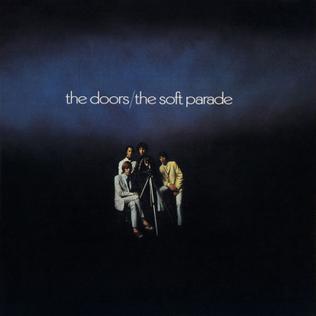
The Soft Parade is the fourth studio album by American rock band the Doors, released on July 18, 1969, by Elektra Records. Most of the album was recorded following a grueling tour during which the band was left with little time to compose new material. Record producer Paul A. Rothchild recommended a total departure from the Doors' first three albums: develop a fuller sound by incorporating brass and string arrangements provided by Paul Harris. Lead singer Jim Morrison, who was dealing with personal issues and focusing more on his poetry, was less involved in the songwriting process, allowing guitarist Robby Krieger to increase his own creative output.

Albert Gene Collins was an American electric blues guitarist and singer with a distinctive guitar style. He was noted for his powerful playing and his use of altered tunings and a capo. His long association with the Fender Telecaster led to the title "The Master of the Telecaster".

The Food Album is a compilation album by American singer-songwriter "Weird Al" Yankovic, released on June 22, 1993, by Scotti Brothers Records. The release features ten of Yankovic's song parodies, all of which pertain to food. A similar album, The TV Album, which features songs entirely about television, would be released two years later.
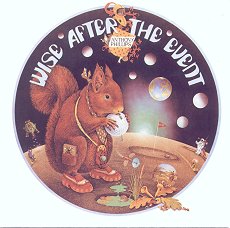
Wise After the Event is the second studio album by English musician and composer Anthony Phillips, released in May 1978 on Arista Records in the United Kingdom and in June 1978 on Passport Records in the United States. After promoting his previous album The Geese & the Ghost (1977), Phillips began to prepare material for a new album. It remains his only album that features himself on lead vocals on each track.

Strip-mine is the second studio album by English rock band James. It was released on 26 September 1988, through Sire and Blanco y Negro Records. After minimal touring and lack of success for their debut studio album Stutter (1986), the label was apprehensive about letting them record another album. Sessions for it were held in early 1987 at Rockfield Studios with Hugh Jones producing the majority of the album, except for "Are You Ready", which produced by Steve Power and Steve Lovell. After the recording, the release was delayed a number of times, until it was eventually remixed early the following year at London's Battery Studios. Described as a folk-pop album, the songs on Strip-mine tackled the topics of misinformation, addiction, and human mortality.

"Jesus He Knows Me" is a song by English rock band Genesis from their 14th studio album, We Can't Dance (1991), released in July 1992 as the album's fourth single. The song is a satire of televangelism, released in a period when several televangelists such as Jimmy Swaggart, Robert Tilton and Jim Bakker were under investigation for promising financial success to their listeners, provided they sent money to them. The song reached No. 10 in Canada, No. 20 in the United Kingdom and No. 23 in the United States.

"I Can't Dance" is the fourth track from English rock band Genesis's fourteenth studio album, We Can't Dance (1991), and was released in December 1991 as the second single from the album. Lyrics were composed by drummer Phil Collins; music was written collectively by the band. The song peaked at number seven on both the US Billboard Hot 100 and the UK Singles Chart, and also received a Grammy Award nomination for Best Pop Performance by a Duo or Group With Vocals in 1993. In Europe, the song reached number one in Belgium and the Netherlands, while peaking within the top five in Austria, Germany, and Portugal.
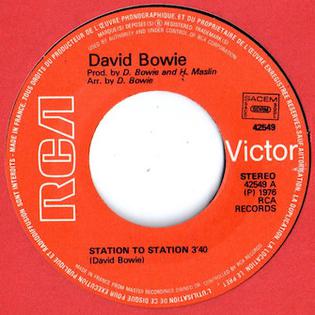
"Station to Station" is a song by the English musician David Bowie. It was released in January 1976 as the title track and opener of his tenth studio album Station to Station, as well as on a promotional 7-inch single in France the same month. Co-produced by Bowie and Harry Maslin, it was written and recorded in Los Angeles between September and November 1975. At over 10 minutes in length, it is Bowie's longest studio recording. Opening with a train-like noise, the song's first half is a slow march, while the second takes the form of a prog-disco suite in a different key and tempo than the first. It has been characterised as art rock and is influenced by the German electronic bands Kraftwerk and Tangerine Dream.

"Teardrop" is a song by English trip hop group Massive Attack. Vocals are performed by Elizabeth Fraser, former lead singer of Cocteau Twins, who also wrote the lyrics. It was released on 27 April 1998 by Circa and Virgin as the second single from the group's third studio album, Mezzanine (1998). A harpsichord-driven track, "Teardrop" was originally set to feature vocals from Madonna, whom Massive Attack turned down in favour of Fraser.
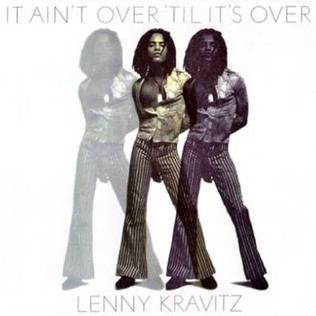
"It Ain't Over 'til It's Over" is a song written, produced, and performed by American musician Lenny Kravitz for his second studio album, Mama Said (1991). Released as the album's second single in June 1991 by Virgin, the song is a mid-tempo ballad musically inspired by Motown, Philly soul, and Earth, Wind & Fire. The horn line at the end is performed by the Phenix Horns from Earth, Wind & Fire. "That song just came out one day, and I knew it had a classic vibe. And I still love that song very much today," Kravitz said in an interview for VivaMusic.com in 2000. The line is based on a Yogiism, or quotation from Yogi Berra: "It ain't over 'til it's over."
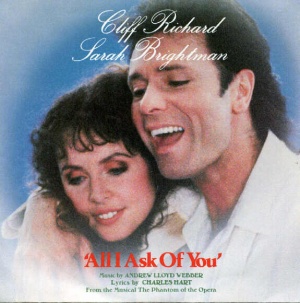
"All I Ask of You" is a song from the 1986 English musical The Phantom of the Opera, between characters Christine Daaé and Raoul, originally played on stage by Sarah Brightman and Steve Barton, respectively. It was written by Andrew Lloyd Webber, Charles Hart and Richard Stilgoe, and solely produced by Lloyd Webber. An operatic pop piece, its lyrics serve as dialogue between the two characters and discuss themes such as commitment and romance. Like Lloyd Webber's song "The Music of the Night", "All I Ask of You" was compared to the music found in Giacomo Puccini's 1910 opera La fanciulla del West.
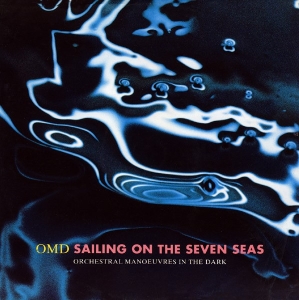
"Sailing on the Seven Seas" is a song by English electronic music band Orchestral Manoeuvres in the Dark (OMD), released on 18 March 1991 by Virgin as the first single from their eighth studio album, Sugar Tax (1991). Along with 1981's "Souvenir", it is the band's highest-charting UK hit to date, peaking at number three on the UK Singles Chart. It also charted at number three in Austria and Sweden, number five in Ireland and number nine in Germany. The single was the first to be released by OMD without co-founder Paul Humphreys, who had left to form his own band the Listening Pool.

Don't Lose Your Cool is a studio album by the American musician Albert Collins, released in 1983 by Alligator Records.

Penguin Eggs is the fifth and final studio album by English folk musician and singer Nic Jones, released by Topic Records in 1980. After establishing himself as a sought after figure on the British folk revival scene, Jones recorded Penguin Eggs with producer Tony Engle; it consists largely of traditional folk songs arranged by Jones, but also includes three contemporary tracks by other writers. Exemplified throughout the album is Jones' intricate acoustic guitar playing style, characterised by a distinctive, percussive plucking style and use of open tunings. He also plays fiddle on one song, while he is joined on many tracks by Tony Hall on melodeon and Bridget Danby on recorder.
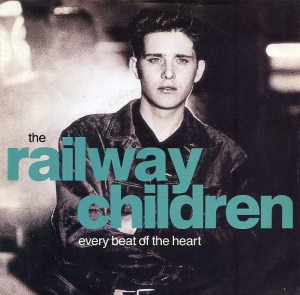
"Every Beat of the Heart" is a song by English new wave band the Railway Children, released as the lead single from their third studio album, Native Place (1990), in February 1990. The track was written by lead singer Gary Newby while production was helmed by Steve Lovell and Steve Power, and it was recorded in London in mid-1989. Music critics responded positively to the song, calling it an improvement on the band's earlier works.
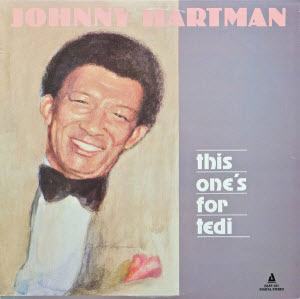
This One's for Tedi is a studio album by American jazz vocalist Johnny Hartman, released in 1985 by Audiophile Records. It was his final studio recording, made in August 1980, three years before his death. The album is dedicated to Hartman's wife Theodora (Tedi). According to producer George H. Buck Jr., This One's for Tedi "was the first digital recording to be made in Canada."

"She's a Girl and I'm a Man" is a song by English singer, songwriter and musician Lloyd Cole, released in 1991 as the lead single from his second studio album Don't Get Weird on Me Babe. The song was written by Cole and Robert Quine, and produced by Cole, Fred Maher and Paul Hardiman. It peaked at number 55 in the UK Singles Chart and remained in the top 75 for two weeks. In the US, it reached number 7 on the Billboard Modern Rock Tracks chart.


















